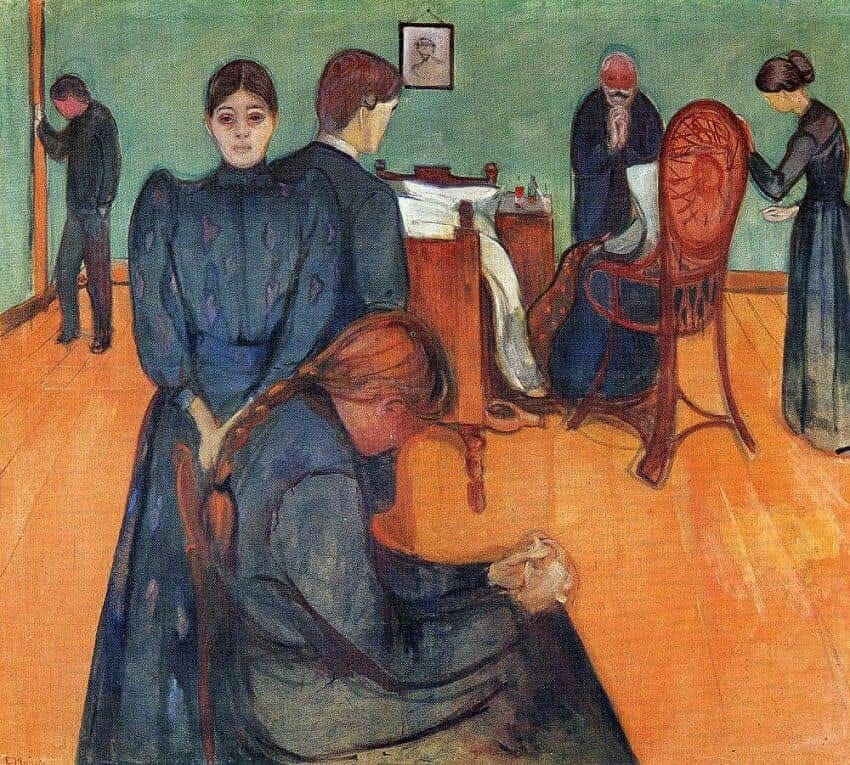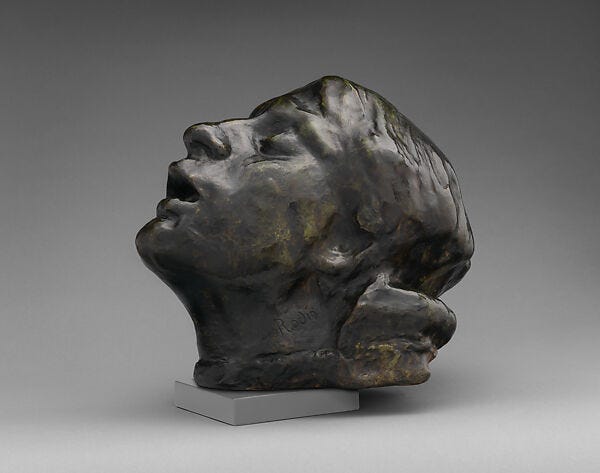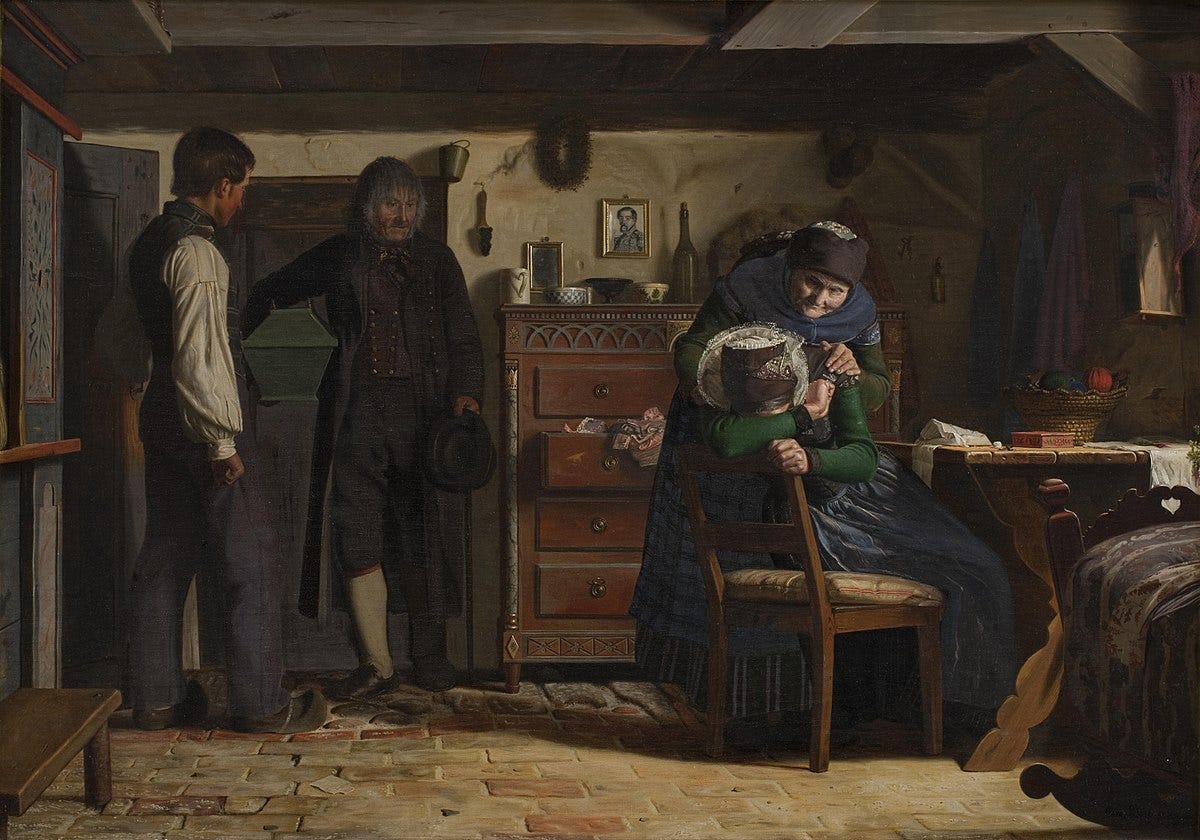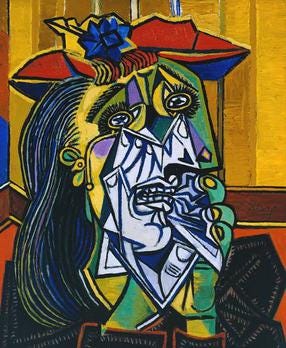The anthology this week brings together writers who’ve tried to put into words the most complex and overwhelming feeling of all — grief.
First of two parts.
The Widow I, Käthe Kollwitz, 1921–2
“Nature’s first green is gold, / Her hardest hue to hold. / Her early leaf’s a flower; / But only so an hour. / Then leaf subsides to leaf, / So Eden sank to grief, / So dawn goes down to day / Nothing gold can stay.”
Robert Frost, Nothing Gold Can Stay
“Your body is away from me / but there is a window open / from my heart to yours.
From this window, like the moon / I keep sending news secretly.”
Rumi
“No one ever told me that grief felt so like fear. I am not afraid, but the sensation is like being afraid. The same fluttering in the stomach, the same restlessness, the yawning. I keep on swallowing.
At other times it feels like being mildly drunk, or concussed. There is a sort of invisible blanket between the world and me. I find it hard to take in what anyone says. Or perhaps, hard to want to take it in. It is so uninteresting. Yet I want the others to be about me. I dread the moments when the house is empty. If only they would talk to one another and not to me.”
C.S. Lewis, A Grief Observed, 1961
“A summer has gone, a cold autumn is setting in, but I've no sense of my time as having any duration, or any future. Time now is a plateau. I only know whether an event came before or after the date of the death. If there was a death. I didn't see the body. His body. Not that the sight always helps to anchor your belief in the fact. What a lumpish little word: 'dead'. And 'died' seems an increasingly silly verb. 'Dead', used of the lively J, strikes me as not only unlikely, but mistaken. A prematurely coarse verdict. Like John Donne's phrase; 'her death which word wrongs her. Instead I want to say 'since he vanished'. That seems far more accurate. It's better conveyed in French or in Italian, where without any affectation you could call someone's death 'his disappearance', or you might naturally say that 'she has left us'.”
Denise Riley, Time Lived Without Its Flow, 2012
Death in the Sickroom, Edvard Munch, 1893
“To live in this world
you must be able / to do three things: / to love what is mortal; / to hold it
against your bones knowing / your own life depends on it; / and, when the time comes to let it go, / to let it go.”
Mary Oliver, Extract from In Blackwater Woods
“When I am sitting at the window, / Through the panes, which the snow blurs, / I see the lovely images, hers, as / She passes… passes… passes by…
Over me grief has thrown its veil:- / Less a creature in this world / And one more angel in the sky.
When I am sitting at the window, / Through the panes, which the snow blurs, / I think I see the image, hers, / That's not now passing… not passing by…”
Fernando Pessoa, As She Passes
“Dear Fanny
It is with deep grief that I learn of the death of your kind and brave Father; and, especially, that it is affecting your young heart beyond what is common in such cases. In this sad world of ours, sorrow comes to all; and, to the young, it comes with bitterest agony, because it takes them unawares. The older have learned to ever expect it. I am anxious to afford some alleviation of your present distress. Perfect relief is not possible, except with time. You can not now realize that you will ever feel better. Is not this so? And yet it is a mistake. You are sure to be happy again. To know this, which is certainly true, will make you some less miserable now. I have had experience enough to know what I say; and you need only to believe it, to feel better at once. The memory of your dear Father, instead of an agony, will yet be a sad sweet feeling in your heart, of a purer and holier sort than you have known before.
Please present my kind regards to your afflicted mother.
Your sincere friend
A. Lincoln”
Abraham Lincoln, Letter to a bereaved young woman, cited in Lincoln: Speeches and Writings
“Unmindful of the roses, / Unmindful of the thorn, / A reaper tired reposes / Among his gathered corn: / So might I, till the morn!”
Christina Rosetti, One Sea-side Grave
Head of Sorrow, Auguste Rodin, 1882
“In what, now, does the work which mourning performs consist? I do not think there is anything far-fetched in presenting it in the following way. Reality-testing has shown that the loved object no longer exists, and it proceeds to demand that all libido shall be withdrawn from its attachments to that object. This demand arouses understandable opposition-it is a matter of general observation that people never willingly abandon a libidinal position, not even, indeed, when a substitute is already beckoning to them. This opposition can be so intense that a turning away from reality takes place and a clinging to the object through the medium of a hallucinatory wishful psychosis.”
Sigmund Freud, Mourning and Melancholia, 1917
“And then I started crying. Not crying like I used to years ago whenever I fell down and hurt myself; and not crying like I used to at some funerals either; and not crying like when Mam went home and left me in Guto’s bed at Bwlch Farm ages ago. But crying just like being sick. Crying without caring who was looking at me. Crying as though it was the end of the world. Crying and screaming the place down, not caring who was listening. And glad to be crying, the same way some people are glad when they’re singing, and others are glad when they’re laughing. Dew, I’d never cried like that before, and I’ve never cried like that since, either. I’d love to be able to cry like that again, just once more.”
Caradog Prichard, One Moonlit Night, 1961
“O that ’twere possible / After long grief and pain / To find the arms of my true love / Round me once again!...
A shadow flits before me, / Not thou, but like to thee: / Ah, Christ! that it were possible / For one short hour to see / The souls we loved, that they might tell us / What and where they be!”
Alfred, Lord Tennyson, Maud: O that 'twere possible
“Try and don't let me grieve. Come and try to extinguish / This wild onslaught of sadness that rumbles like mercury in Torricellian void. / Madness, try and forbid me to feel, come and try! / Do not let me rant on about you! We're alone-don't be shy. / Now, extinguish it, do! Only-hotter!”
Boris Pasternak, Try and Don't Let Me Grieve
The Village Carpenter Bringing a Coffin for a Dead Child, Christen Dalsgaard, 1824-1907
“It is better to conquer our grief than to deceive it. For if it has withdrawn, being merely beguiled by pleasures and preoccupations, it starts up again and from its very respite gains force to savage us. But the grief that has been conquered by reason is calmed for ever. I am not therefore going to prescribe for you those remedies which I know many people have used, that you divert or cheer yourself by a long or pleasant journey abroad, or spend a lot of time carefully going through your accounts and administering your estate, or constantly be involved in some new activity. All those things help only for a short time; they do not cure grief but hinder it. But I would rather end it than distract it.”
Seneca, Consolation to Helvia, 43AD
MALCOLM
Be comforted. / Let’s make us med’cines of our great revenge / To cure this deadly grief.
MACDUFF
He has no children. All my pretty ones? / Did you say “all”? O hell-kite! All? / What, all my pretty chickens and their dam / At one fell swoop?
MALCOLM
Dispute it like a man.
MACDUFF
I shall do so, / But I must also feel it as a man.
William Shakespeare, Macbeth, 1606
“Gradually, you will learn acquaintance / With the invisible form of your departed; / And when the work of grief is done, / The wound of loss will heal / And you will have learned / To wean your eyes / From that gap in the air / And be able to enter the hearth / In your soul where your loved one / Has awaited your return / All the time.”
John O’Donohue, Extract from For Grief
“For the rest of my life, I will live with my hands outstretched for things that are no longer there.”
Chimamanda Ngozi Adichie, Notes on Grief, 2021
The Weeping Woman, Pablo Picasso, 1937









A superb collection, many I have never encountered before but I will hold on to them now. Thank you.
Much appreciated. Thank you !